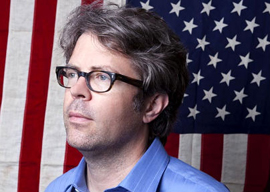
July 05, 2011

Jonathan Franzen
Since David Foster Wallace is dead, they published his student thesis in philosophy, a refutation of a short Richard Taylor essay on fatalism.
“The fatalist contends, quite radically, that human actions and decisions have no influence on the future. Your behavior today no more shapes events tomorrow than it shapes events yesterday.” Richard Taylor does not support the claim but proves it semantically, and Foster Wallace “bends over backward” to “[prove] that you couldn’t, in fact, deprive the universe of possibility with just a bit of logical and linguistic finesse.”
His whole essay is a fight against a certain understanding of logic, which he could just as well have refused to use. David Foster Wallace—like countless men before and after him, clever ones, too—bombards the a priori with heavy artillery when he could have just puffed at that house of cards or walked around it.
But Fate, Time, and Language was only a student thesis. Then he moved on to literature.
In Brief Interviews with Hideous Men, Wallace displays, in a few of the best pages, a grasp of psychology much finer than any contained in Freedom’s five hundred. He understood the mess and describes it from the inside, which may be why Franzen chose to attack him on his most obvious flaw: his excessive reliance on cleverness.
“Dave’s level of purely linguistic achievement was a turf that I knew better than to try to compete on,” said Franzen, slashing the ties between style and substance and leaving a void into which he could only fall.
What both writers shared was the heavy use of aww-shucks regular-guy Americanisms, perhaps a necessary protection for Wallace and a pose that comes naturally to Franzen.
In a recent commencement speech reprinted in The New York Times, Franzen explains to children the difference between liking something on Facebook and the messiness of real love—real because it is messy. The speech opens with a description of his new BlackBerry. It is ironic and he regrets having to do it, but still, it is what the people want, so he gives it to them, and besides, he is the people and therefore wants it, too.
So he talks about his love for his BlackBerry, but with a wink. He seems to do that a lot: winking as he acquiesces. From an interview in The Paris Review: “I hate the word creative, but it’s not a bad description of my personality type.” Jonathan does what must be done with the tools at hand, freely competing in the free market.
And what bound Wallace? His precocity? His talent? The drama of the gifted child?
“I think I had a kind of midlife crisis at twenty, which probably doesn’t augur well for my longevity,” Wallace predicted.
Instead of continuing to climb, he killed himself arguing about whether it was even possible to climb. What a pity. Franzen kept right on walking, straight to the top. For such a competitive man, in terms of status only the summit will do; but in terms of thought, the middle is just fine.